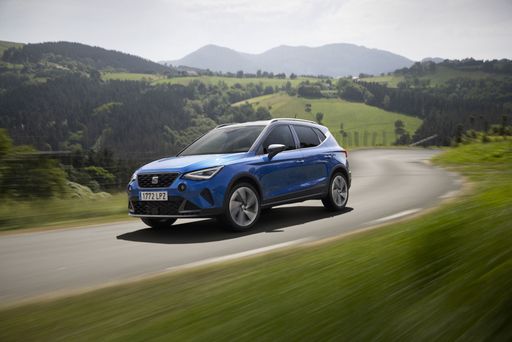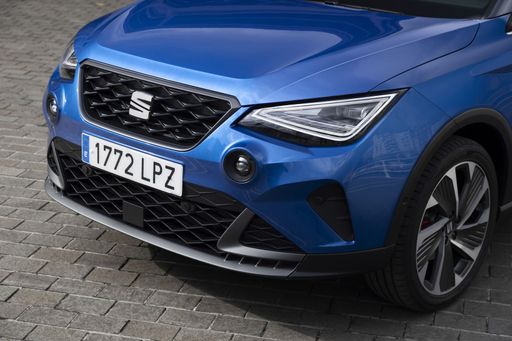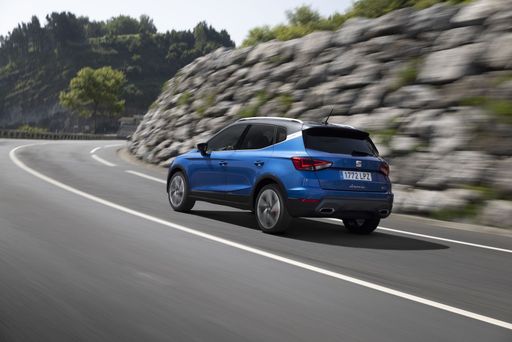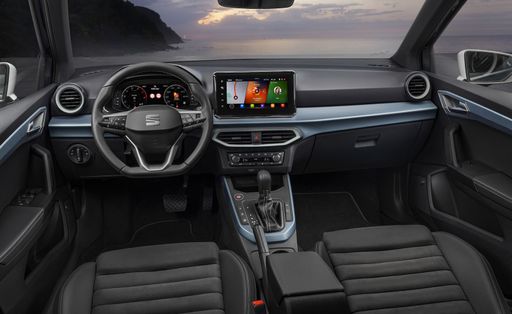SEAT Arona VS Nissan Leaf – Specs, Efficiency & Price Comparison
Which model is the better choice – the SEAT Arona or the Nissan Leaf? We compare performance (150 HP vs 217 HP), boot capacity (400 L vs 394 L), efficiency (5.40 L vs 16.70 kWh), and of course, the price (18900 £ vs 30800 £).
Find out now which car fits your needs better!
The SEAT Arona (SUV) is powered by a Petrol engine and comes with a Manuel or Automatic transmission. In comparison, the Nissan Leaf (Hatchback) features a Electric engine and a Automatic gearbox.
When it comes to boot capacity, the SEAT Arona offers 400 L, while the Nissan Leaf provides 394 L – depending on what matters most to you. If you’re looking for more power, you’ll need to decide whether the 150 HP of the SEAT Arona or the 217 HP of the Nissan Leaf suits your needs better.
There are also differences in efficiency: 5.40 L vs 16.70 kWh. In terms of price, the SEAT Arona starts at 18900 £, while the Nissan Leaf is available from 30800 £.
Compare all the key specs now and find out which model fits your lifestyle best!
SEAT Arona
The SEAT Arona is a stylish compact SUV that blends urban agility with a robust design, making it an ideal choice for city dwellers and adventure seekers alike. Inside, it offers a well-crafted interior with modern technology and connectivity features that enhance the driving experience. With its efficient engine options and responsive handling, the Arona provides a dynamic ride while maintaining impressive fuel efficiency.
details @ seat-mediacenter.de
@ seat-mediacenter.de
 @ seat-mediacenter.de
@ seat-mediacenter.de
 @ seat-mediacenter.de
@ seat-mediacenter.de
 @ seat-mediacenter.de
@ seat-mediacenter.de
Nissan Leaf
The Nissan Leaf stands out as a pioneering model in the realm of electric vehicles, known for its impressive blend of practicality and eco-friendliness. It offers a smooth and quiet driving experience, making it an ideal choice for city commuting and longer journeys alike. The interior design is both comfortable and intuitive, providing drivers with a sense of modernity and ease of use.
details @ germany.nissannews.com
@ germany.nissannews.com
 @ germany.nissannews.com
@ germany.nissannews.com
 @ germany.nissannews.com
@ germany.nissannews.com
 @ germany.nissannews.com
@ germany.nissannews.com

|

|
|
|
|
Costs and Consumption |
|
|---|---|
|
Price
18900 - 28900 £
|
Price
30800 - 37200 £
|
|
Consumption L/100km
5.4 - 5.6 L
|
Consumption L/100km
-
|
|
Consumption kWh/100km
-
|
Consumption kWh/100km
16.7 - 17.8 kWh
|
|
Electric Range
-
|
Electric Range
270 - 385 km
|
|
Battery Capacity
-
|
Battery Capacity
39 - 59 kWh
|
|
co2
122 - 128 g/km
|
co2
0 g/km
|
|
Fuel tank capacity
40 L
|
Fuel tank capacity
-
|
Dimensions and Body |
|
|---|---|
|
Body Type
SUV
|
Body Type
Hatchback
|
|
Seats
5
|
Seats
5
|
|
Doors
5
|
Doors
5
|
|
Curb weight
1188 - 1268 kg
|
Curb weight
1580 - 1756 kg
|
|
Trunk capacity
400 L
|
Trunk capacity
385 - 394 L
|
|
Length
4153 mm
|
Length
4490 mm
|
|
Width
1780 mm
|
Width
1788 mm
|
|
Height
1537 mm
|
Height
1540 - 1545 mm
|
|
Payload
502 - 522 kg
|
Payload
384 - 415 kg
|
Engine and Performance |
|
|---|---|
|
Engine Type
Petrol
|
Engine Type
Electric
|
|
Transmission
Manuel, Automatic
|
Transmission
Automatic
|
|
Transmission Detail
Schaltgetriebe, Automat. Schaltgetriebe (Doppelkupplung)
|
Transmission Detail
Reduction Gearbox
|
|
Drive Type
Front-Wheel Drive
|
Drive Type
Front-Wheel Drive
|
|
Power HP
95 - 150 HP
|
Power HP
150 - 217 HP
|
|
Acceleration 0-100km/h
8.4 - 11.3 s
|
Acceleration 0-100km/h
6.9 - 7.9 s
|
|
Max Speed
182 - 210 km/h
|
Max Speed
144 - 157 km/h
|
|
Torque
175 - 250 Nm
|
Torque
320 - 340 Nm
|
|
Number of Cylinders
3 - 4
|
Number of Cylinders
-
|
|
Power kW
70 - 110 kW
|
Power kW
110 - 160 kW
|
|
Engine capacity
999 - 1498 cm3
|
Engine capacity
-
|
General |
|
|---|---|
|
Model Year
2024 - 2025
|
Model Year
2019
|
|
CO2 Efficiency Class
D
|
CO2 Efficiency Class
A
|
|
Brand
SEAT
|
Brand
Nissan
|
SEAT Arona
Discovering the SEAT Arona: A Perfect Urban SUV
The SEAT Arona has consistently positioned itself as an ideal choice for those seeking a versatile and dynamic urban SUV. Packed with innovative features and robust performance, the Arona combines sleek design with practicality. The 2024 model offers compelling options and upgrades, ensuring it remains a strong contender in the B-SUV segment.
Performance and Efficiency: Engineered to Excel
The SEAT Arona is equipped with a range of efficient and powerful petrol engines, varying from 95 PS to 150 PS, covering a spectrum of driving preferences. The 1.0 TSI engines are expertly engineered to deliver both nimble city manoeuvring and efficient long-distance cruising. Fuel consumption figures range between 5.4 to 5.6 L/100km, making the Arona an economically sound choice, balancing spirited performance with fuel efficiency.
Technology: Innovation at its Core
Innovation is a focal point in the Arona's technological offerings. The integration of a digital cockpit, alongside an intuitive infotainment system, provides drivers with seamless connectivity and ease of use. Smart technology includes wireless charging, adaptive cruise control, and parking assistance, ensuring every drive is convenient and connected.
Design and Comfort: Stylish and Spacious
The Arona's design continues to be its hallmark, boasting a bold and dynamic style that stands out on city streets. The exterior's sharp lines and contemporary aesthetics are matched by a comfortable and spacious interior, making the Arona a desirable choice for urban dwellers. With a boot capacity of 400 L, it also offers commendable practicality for everyday and getaway needs alike.
Safety First: Advanced Safety Features
Safety remains a priority with the SEAT Arona. Equipped with a suite of advanced safety technologies, including lane assist, emergency braking, and rear cross-traffic alert, the Arona provides peace of mind. Its robust build and comprehensive safety system ensure protection for all occupants, aligning with modern safety expectations.
Customisation and Range: Tailored to Your Taste
The Arona's wide range of trim options, including FR, FR Anniversary Edition, Style, and Xperience, allow for a highly customisable SUV, catering to diverse stylistic preferences and functional needs. Whether opting for manual or the smooth automatic DSG (7-Gang) transmission, SEAT offers flexibility in creating the ideal driving experience.
Conclusion: A High Achiever in its Class
The SEAT Arona stands as a testament to intelligent design coupled with innovative technology. Its modern features, commendable performance, and cutting-edge design make it an exceptional choice within the urban SUV marketplace. The Arona continues to demonstrate SEAT's commitment to providing a sophisticated and practical vehicle, ensuring it remains a popular choice among discerning drivers.
Nissan Leaf
Introduction to the Nissan Leaf: A Pioneer in Electric Mobility
The Nissan Leaf has established itself as a trailblazer in the realm of electric vehicles (EVs) since its launch. As we delve into its present-day iterations, the Leaf continues to soar in popularity due to remarkable advancements in technology and sustainability. Let's explore what makes the Nissan Leaf a standout in today's automotive market.
Power and Performance: Under the Hood of the Nissan Leaf
The Nissan Leaf boasts a power output ranging from 150 to 217 PS, depending on the battery option chosen. The vehicle's electric motor, a product of cutting-edge engineering, offers instant torque ranging from 320 to 340 Nm, resulting in impressive acceleration capabilities. The 0 to 100 km/h dash is achieved in as little as 6.9 seconds, showcasing its prowess in electric performance.
Battery Technology: Efficient Energy Management
When discussing the Nissan Leaf, battery technology is at the forefront. The available battery capacities range from 39 to 59 kWh, supporting an electric range between 270 to 385 km. This flexibility allows drivers to choose a model that best fits their driving habits, providing peace of mind for longer journeys without frequent recharging.
Sustainability: The Environmental Edge
One of the primary attractions of the Nissan Leaf is its commitment to sustainability. As an all-electric vehicle, it produces zero CO2 emissions, placing it in the top tier of the CO2-efficiency class with an 'A' rating. This clean energy approach contributes significantly to reducing environmental impact and supports Nissan's drive towards a greener future.
Design and Comfort: Aesthetic Appeal and Practicality
The Nissan Leaf is not just about efficiency; it's also designed for comfort and utility. With its sleek hatchback body and dimensions of 4490 mm in length, 1788 mm in width, and a height of up to 1545 mm, it offers ample interior space. The boot capacity ranges from 385 to 394 litres, providing sufficient storage for everyday needs. The model accommodates five passengers comfortably, ensuring a pleasant ride for everyone.
Innovations and Safety: Advanced Features for Peace of Mind
Nissan equips the Leaf with an array of intelligent features that enhance safety and convenience. The available equipment lines, including N-CONNECTA, Tekna, e+ N-CONNECTA, and e+ Tekna, offer varying levels of technology integration. ProPILOT Assist, e-Pedal, and a comprehensive suite of driver-assistance technology are just a few examples that highlight Nissan's commitment to innovation in the EV market.
Conclusion: The Nissan Leaf Continues to Lead
With prices ranging from €35,900 to €43,400, the Nissan Leaf remains an attractive choice for those looking to embrace electric mobility. It perfectly balances performance, design, and sustainability, making it a compelling choice in the competitive EV landscape. The Nissan Leaf not only represents the future of driving but also reinforces why it continues to be a leader in the electric vehicle community.
The prices and data displayed are estimates based on German list prices and may vary by country. This information is not legally binding.
